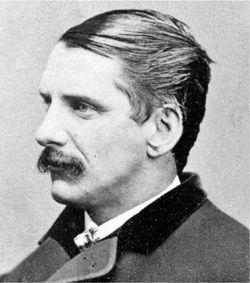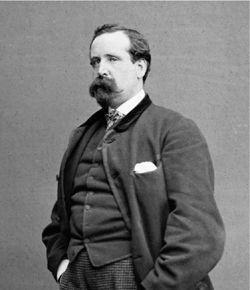A World on Fire: Britain's Crucial Role in the American Civil War (144 page)
Read A World on Fire: Britain's Crucial Role in the American Civil War Online
Authors: Amanda Foreman
Tags: #Europe, #International Relations, #Modern, #General, #United States, #Great Britain, #Public Opinion, #Political Science, #Civil War Period (1850-1877), #19th Century, #History
19.
U.S. General William Sherman (1820–91). Sherman began the war in command of a single brigade (which included the “Fighting 69th”), but he so distinguished himself that General Grant gave him control over all the Union armies west of Virginia. Sherman implemented a policy of total war against the South during his march from Atlanta to Savannah, Georgia, in 1864.

20.
William Howard Russell (1820–1907). “Russell of the Crimea” was the most famous journalist in the world when he arrived in the North to cover the Civil War. His unbiased reports for The Times were considered insufficiently favorable to the North and in 1862 he was harassed into leaving the country.

21.
Edward Dicey (1832–1911), pro-Northern English journalist for the Spectator. He published an account of his travels after his return home.

22.
The Hon. Francis Lawley (1825–1901), pro-Southern British journalist for The Times. The war gave Lawley a second chance to redeem himself after his gambling debts forced him into exile. He became so enamored with the South that he willingly misrepresented events to show the Confederacy in a better light.

23.
Frank Vizetelly (1830–83), British war artist and pro-Southern correspondent for the Illustrated London News. “He was a big, florid, red-bearded Bohemian,” recalled an admirer, “who could and would do anything to entertain a circle.”

24.
Confederate President Jefferson Davis (1808–89). Davis seemed an ideal choice for the Confederate presidency, having served as a senator for Mississippi and as secretary of war under President Franklin Pierce, but he was notoriously thin-skinned and incapable of delegating. Davis was shocked and disappointed when Britain failed to recognize Southern independence.

25.
The inauguration of Confederate President Jefferson Davis in Montgomery, Alabama, on February 18, 1861. Davis used his speech to prepare Southerners for war: “We have entered upon the career of independence and it must be inflexibly pursued.”

26.
The Confederate White House, Richmond, Virginia. The Davis family lived here from 1861 to 1865. Tragedy struck in 1864 when five-year-old Joe Davis was killed by a fall from a first-floor balcony.

27.
Richmond, Virginia, during the war. Known as the “City of Seven Hills,” it was named after Richmond in London because the view of the James River from its highest hill reminded the city’s founder, William Byrd, of the Thames from Richmond Hill.

28.
General Robert E. Lee (1807–70), Confederate commander of the Army of Northern Virginia. The South’s most famous general was admired by both sides during the war, and British travelers were invariably starstruck when introduced to him. Lieutenant-Colonel Garnet Wolseley of the British Army wrote that Lee was “a splendid specimen of an English gentleman, with one of the most rarely handsome faces I ever saw.… You only have to be in his society for a very brief period to be convinced that whatever he says may be implicitly relied upon.”

29.
General Thomas J. “Stonewall” Jackson (1824–1863), Confederate commander of the famous Stonewall Brigade, who earned his nickname during the First Battle of Bull Run. He went on to form a successful partnership with Lee until his death from friendly fire at Chancellorsville in 1863. On hearing that Jackson’s arm had been amputated, Lee replied: “He has lost his left arm; but I have lost my right arm.”